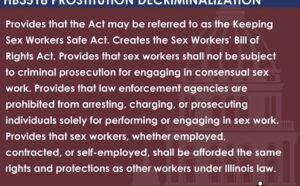From The Washington Post: This is a guest post by Samantha Majic, a political scientist at CUNY-John Jay and the author of Sex Work Politics, on what prostitutes can teach the Canadian government.
Canada’s Supreme Court has just declared the country’s anti-prostitution laws unconstitutional. The Canadian Parliament now has one year to rewrite its prostitution laws, and we in the United States should closely watch what happens next. This ruling provides a much-needed opportunity for legislators and sex workers to work together and create a framework that will help adult prostitutes work safely.

Terri-Jean Bedford talks to reporters at the Supreme Court of Canada in Ottawa Friday morning, Dec. 20, 2013 after learning Canada’s highest court struck down the country’s prostitution laws in their entirety in a unanimous 9-0 ruling. The retired dominatrix is one of the three principals in the Supreme Court case.
In Canada, prostitution is actually legal. However, all of the activities surrounding it, such communicating in public, living off of the earnings or running a bawdy house, were not. Valerie Scott, Amy Lebovitch and Terri-Jean Bedford, the advocates of sex-worker rights who initiated the case Bedford v. Canada, argued that these laws endangered prostitutes by forcing them to work in out-of-the-way locations and conceal their activities from their peers, families and friends. They had ample evidence to support their claims, such as the notorious case of Robert Pickton, who was convicted in 2007 of murdering nearly 50 Vancouver prostitutes.
While many support this ruling, a vast and vocal group of individuals and advocates argue that it opens the floodgates for sex trafficking, community ruin and the victimization of women and girls. However, none of this has to happen, especially if Canadian legislators work closely with sex workers to develop policies that acknowledge adult prostitution as legitimate work.
In the mainstream media, prostitution is almost always conflated with sex trafficking. One only has to look at Nicholas Kristof’s pieces in The New York Times, for example, to learn that women and girls are kidnapped and forced into prostitution against their will. But not all prostitutes are victims. And the tendency to focus on trafficking has not led to policies that keep sex workers safe and healthy. Especially in the United States, the equation of prostitution with trafficking has led to more spending on law enforcement in order to arrest pimps, clients and traffickers. While few would argue against punishing traffickers, these strategies have also resulted in more arrests of sex workers themselves. Meanwhile, policies that would help to ensure sex workers’ health and safety and even help them exit the sex industry — such as affordable housing, living wages and accessible health care — are few and far between.







 TrafficHolder.com - Buy & Sell Adult Traffic
TrafficHolder.com - Buy & Sell Adult Traffic